- Home
- Michael Wallace
The Red Sword (The Red Sword Trilogy Book 1) Page 22
The Red Sword (The Red Sword Trilogy Book 1) Read online
Page 22
“Not if the garden falls. If that happens, get the sword before you flee. Take it far from here, keep it out of the enemy’s grasp.”
The idea that the garden could fall shocked Markal. “Will it come to that?”
“Quite possibly. I’d even say it is probable. As for the sword, if you can’t take it, at least make sure it is destroyed. Nathaliey or Chantmer can do it if you can’t manage.”
Now that they were alone, there was no nonsense about Markal being a wizard, and Chantmer and Nathaliey being merely apprentices. Memnet must have seen the look of dismay on Markal’s face, because he put a comforting hand on the younger man’s shoulder.
“You know your limitations, and that is not a terrible thing, my friend.”
“Everybody knows my limitations,” Markal said. “All of them, even the stablehands, and what magic do they have except to calm a horse or make a cow give more milk? Master, it didn’t make me stronger to declare me a wizard, it only weakened Narud. Now people think his elevation was fraud as well.”
“It wasn’t a fraud, and neither was yours. Some day you’ll understand that. The truth is, you’ve been ready for some time. More so than the other three.”
“I wasn’t ready before, and I’m not now.”
Memnet stopped and leaned on his cane. They’d come into the open, and his face was even paler in the direct sunlight than in the dappled forest. “Tell me, Markal, am I a wizard?”
“You are Memnet the Great. If you’re not a wizard, who is?”
“I don’t mean, am I a wizard in general terms. Am I one right now? Look at me. Am I a wizard? If I called up a spell right now, one of the hundreds of incantations I know, my bones would snap and blood would stream out of my ears and nose. I’d likely kill myself in the attempt. By what rights am I a wizard?”
“But that’s different. You’re temporarily weak. I’m permanently disabled.”
Memnet made a dismissive gesture and set off hobbling again. The Golden Pavilion lay ahead of them, and they were crossing open meadow, where the dew dampened their feet and the hems of their robes.
“Well?” Markal pressed. “Am I wrong? It isn’t knowledge that makes one a wizard—knowledge merely makes you an archivist. It isn’t authority. Any baron, khalif, or sultan possesses that.”
“It isn’t magical power, either.”
“No, Master?”
“Otherwise, Bronwyn of Arvada was a wizard—the red sword contains as much magic as anything else in this garden. But she wasn’t—she was a paladin.”
“So I am a wizard? You continue to insist, in spite of all evidence to the contrary? You’ve proclaimed it, and that makes it so?”
“Markal, you’re not a wizard because I proclaimed you one. You are a wizard because you are a wizard. I’ve met a fair number over the years, and I’ve grown adept at identifying them.” He grinned. “Congratulations! Use your powers wisely.”
#
Markal took his place that night in the tent encampment near the north gate, among the palace guard. Half the guard was posted at the north gate, and the other half at the south. These two entry points had been intentionally weakened to lure the enemy to attack here. Of the two gates, Markal thought the attack was likely to come from the north, following the road over the bridge. The king’s army lay in that direction, together with the highway and the road to Syrmarria.
Used to the quiet of the forest, where the only sounds at night came from owls and other creatures about their nighttime business, Markal had trouble falling asleep in his little tent. Every nearby snore, mumbled conversation, cough, and fart reached his ears. A man in a tent a few yards away whispered a prayer to the gods, begging that someone named Doriella would be protected from the Veyrians. A wife? A lover? A daughter or sister? Markal’s ears brought it all in.
He didn’t consciously remember falling asleep, but realized at some point that he was dreaming. He was walking through the steep, twisting streets of Syrmarria, on his way up the hillside toward the palace. His parents lived somewhere nearby, in a house tucked into a prosperous alley. It was almost dusk in the dream, and he hauled a handcart laden with small wicker cages, each one carrying a chirping cricket. Men, women, and children came out, and he gave them cages, but declined their money.
“I won’t take your coin,” he told them. “The souls of the dead are abroad in the land, and you must be protected.”
He handed out the last of the cages at the gates of the palace itself, handed it to a guard, then took up his cart and worked his way back down toward the souks and marketplaces. But as he retraced his steps, the street was quiet. Where were the crickets he’d handed out? Why weren’t they chirping behind every door and shuttered window?
Markal jerked awake from his dream and sat up straight on his bedroll, forgetting where he was until his head scraped the ceiling of the tent. He found his sandals, laced them up, and crawled outside. A cool breeze whistled over the top of the brick wall.
The camp was strangely quiet. The warmth of sleeping bodies radiated out from the tents, and when Markal strained, he heard steady breathing. There must have been fifty men sleeping around him, plus a handful of acolytes and keepers helping Markal keep watch. Yet nobody rolled in his sleep or snored. Absolutely nobody.
Markal moved toward the wall and touched the brick with his fingertips. It was still warm from the heat of the day, having baked for hours beneath the sun. But that wasn’t all he felt. His fingertips tingled, and the hairs on the back of his neck rose. The wall was trying to warn him.
He wasn’t yet sure enough to raise the alarm, so he scaled the ladder on the right side of the gate and looked down at the mist-draped meadow beyond the garden walls. Overhead, clouds cloaked the half moon, and he peered into the darkness, looking for anything amiss.
The road leading out from the gate was quiet. No sound or movement. Certainly no army of Veyrians marching toward them. But his senses were even more heightened now, and the sense that something was wrong vibrated through him like the unsettled air before a storm. He caught a whiff from the air, too, something carried on the breeze that felt wrong. Not a real scent at all, or at least not a natural scent, but something masquerading as something else.
There! To the right. A tiny flicker of light, a pinprick, really. Then another and another. They gathered against the wall a few yards distant, no larger than flickering fireflies.
It was only when he stared, concentrating, that he realized that something had thrown off his perspective. They were farther away than he’d thought at first glance, and therefore, larger.
Markal pulled his sleeve up and lowered his left hand palm down. He turned and faced the gardens as a simple spell came to his mind.
“Sumas ascendit. Periculum est super nos.”
He whispered the words and cast them over the tent encampment and beyond. He sensed, rather than saw, the acolytes and keepers waking, moving, as his spell jolted them from their slumber. He had sent it wide, but there was no way to tell how far it had traveled. In theory, such a spell could speak into the mind of someone a thousand miles away, standing on the blistering sands of the southern coast, but that depended on the strength of the caster. Markal hoped for a half mile. That would rouse Nathaliey in her cottage, who could in turn alert the others.
When he was sure the acolytes and keepers wouldn’t slip back into their dreams, but were crawling from their tents, Markal climbed off the ladder and onto the wooden platform that had been affixed below the top of the wall. He crawled on his hands and knees toward the blue lights. The platform was new, and only partially completed, and he was soon forced to climb onto the wall itself and scramble along the top. Fortunately, the platform resumed before he reached the lights, and he was able to get onto it and peer up and over.
They were wights, the thin, ethereal souls of men and women, their blank eyes the color of milk, their faces contorted into the grimaces they’d worn at death. They scratched at the brick wall with long, grasping fingers. There were only a
handful at first, not like the hundreds who had pursued Nathaliey, Chantmer, and Narud down the road from Syrmarria, but more came slinking out of the mist, adding to their number.
Markal’s heart was pounding so hard that he thought it must be audible, but none of them glanced up in his direction. The mindless things had only one goal it would seem, and that was to claw apart the wall. Little risk of that. Their spectral fingers might normally manage such a thing with ordinary brick or stone, but not here.
An enemy who tried to climb the wall would find the bricks too slippery for purchase. One who tried to tunnel through would find the center as hard as a solid block of granite, the mortar like tempered steel. A ladder thrown up on the exterior would slide and fall. Even if the wights spotted him, there was nothing they could do from where they stood a dozen feet below. No, they’d eventually be forced to the gate, and there they would face the carefully laid traps and snares.
Knowing that his companions would be roused from their sleep by now and rushing toward the gate to help him in its defense, Markal willed himself to remain calm. There were twenty wights, and they concentrated on three different spots. They clawed and scratched, but accomplished little more than roughening the bricks. At this rate, it would take months, years even. They’d have better luck burrowing through a mountain.
A new figure came out of the mist. He moved swiftly, purposefully, and as he drew near, the half moon glimmered through a gap in the clouds to illuminate his features. It was a man, his face gray, his eyes glinting. His gaze fell immediately on Markal atop the wall. He reached for his side and, in one smooth motion, drew a knife and flung it toward Markal.
It was no easy thing to throw a knife up into the darkness at a man peering over a wall, and at first the aim looked too high, as if it would sail far overhead and land harmlessly in the garden. But at its height, the flight of the blade bent, as if it were enchanted, and it came whistling down toward Markal’s head. He ducked away, but the weapon turned to meet him.
And then the spinning dagger seemed to hit an invisible wall that extended up from the real one. It stopped dead and fell straight to the ground at the base of the wall. The enchanted garden had saved him. The marauder picked up his knife and sheathed it. He looked up at Markal, and a nasty grin split his face.
“I know who you are.” His voice was ugly, like rusty nails scraping together at the bottom of a metal pail. “You’re a tinkerer, a man who has read a few books and thinks he is wise. Who thinks he controls the ancient words of power. But you’re no wizard, are you?”
“I never claimed otherwise,” Markal said. “But one doesn’t need magic to know that you will surely die if you enter the gardens. Assuming you can manage. It seems doubtful, doesn’t it?”
“Such false modesty. You’re as arrogant as the rest of them, and it will be a terrible shock for you when I thrust my blade through your heart.” He touched the hilt of his sword.
“Then it’s a good thing for me that you’re down there and I’m up here. I don’t think your sword will reach that high, do you? Unless you want to throw it.”
The wights moved aside for the man, falling back as he approached the wall. He put a palm on the brick, but immediately jerked his hand back with a hiss, as if burned. The next time, he approached more carefully, touching it quickly and pulling back again.
“Not very pleasant, is it?” Markal said. “Imagine if you could get up where I am. Then you’d see something. It’s hard to say for sure, but I believe you’d find the sensation like stabbing knives.”
“I’ll be up there soon, and then we’ll see, won’t we?” The man had both hands on the brick now, and without pain. Another unpleasant smile crossed his face. “I felt your little spell, you know, when you called for your friends. A weak, quavering thing. Like a trembling mouse in the talons of a hawk. You’ll be no match for me.”
“Go ahead then. Make an attempt. This should be amusing to watch.”
Markal didn’t feel like bandying words. He wanted to hurry back to the gate and rally their defenses. There seemed little risk here. The wights had been clawing away and yet had accomplished little more than making a little brick dust. The marauder had no way to enter or attack and could only hurl taunts or knives that struck an invisible barrier and fell harmlessly. Yet Markal wanted to keep an eye on the enemy until his companions arrived. What was taking so long?
Then he realized something. If Nathaliey had received his message and passed it along, wouldn’t he have heard her warning in turn? His own words coming back to him, like an echo, but in Nathaliey’s voice? She’d apparently either not heard it or failed to send it again to wake the others. He had the sudden, terrible feeling that his warning hadn’t made it beyond the camp of guards and acolytes.
The man groped at the wall until his fingers seemed to find purchase. Then he lifted one leg and dug the toe of his boot into a gap between two bricks. Markal shrank back. What was that? Why didn’t he fall?
Horror blossomed as Markal came to a full understanding. The wights hadn’t been attempting to break through with all of that clawing. They were weakening the exterior defenses was all, scratching away the protective membrane that kept someone from getting a grip on what, beneath it all, was just brick and mortar.
Wake up! Danger is upon us!
It was Nathaliey’s voice in his head, entering with all of the urgency of a clanging bell. He stiffened, and a flood of energy lifted his spirits. It wasn’t merely a warning, but something more: the same spell Markal had cast, but with Nathaliey’s strength to back it. That message would be flooding the entire garden.
But now? Now she was sending his message? Ten minutes had passed since he’d cast his spell. Maybe longer. And Nathaliey was only now passing his warning to the others?
The marauder let out a triumphant cry. He’d gained purchase and was off the ground. He climbed his way inch by inch up the wall toward Markal. Wights came up after him.
Chapter Twenty-Two
Nathaliey was already awake when Markal’s warning entered her head. She’d been turning over something her father had told her earlier that day. She’d been showing Kandibar the beauties of the gardens, and he was exclaiming over every vista, noting the smell that hung heavy in the air by the peach trees, which were flowering again, though it was out of season. He even marveled at the size of the honeybees.
“I would die for this, Daughter,” he said, his voice solemn.
“You’ve never seen it before.”
“This is Aristonia. It is the most fertile stretch of a small and fruitful land. The essence of our country.”
“Centuries of magic and care have made this, Father. You couldn’t simply build a garden like this elsewhere in Aristonia. Otherwise, the palace gardens in Syrmarria would be as beautiful.”
“The palace gardens are beautiful. Travelers come from distant lands to see them.”
“But not beautiful like this.”
“No, not like this,” Kandibar said. “But my point is, you could only have gardens like these in Aristonia. It is a magical country, unlike any other. The land is fertile, but not indestructible. Its people are few, and they are sheltered and peaceful. The Tothian Way will change everything. The flood of merchants and slaves and armies will alter it forever. That is what I’d die to protect.”
She studied him, surprised. Viziers, as a rule, weren’t known as the most bold of individuals. Those who advised tyrants were craven, servile parasites, for the most part. They told their ruler what he wanted to hear. Even with the slightly more enlightened khalifs of Aristonia, rulers like Omar and his father before him, a vizier gave counsel within narrow parameters. Whether the khalif wanted a new aqueduct or a war with a neighbor, the vizier’s task was to advise the best way to successfully realize that task.
Nathaliey’s father had explained this to her when she was only a girl. A vizier who took bold risks was a vizier who found himself without his job, if not his head.
Yet Kandibar Liltig
e was willing to take terrible risks to fight for Aristonia. She’d not thought him the type. Perhaps she was wrong in other assessments, as well.
Later that evening, Nathaliey was turning over these things in the darkness of her cottage when Markal’s voice entered her head. It was an intimate whisper, yet so clear that she sat up, stiff and alarmed, thinking for a moment that he was in the room with her.
Wake up. Danger is upon us.
She was out of bed in an instant, her bare feet on the cold stone floor. She had her robe over her shoulders before a thought occurred to her. Markal was encamped at the north gate with half of the palace guard. If he’d sent his message from there, it might not have reached Narud and the remainder of the Syrmarrians at the south gate, two miles distant. Might not have even reached Chantmer or Memnet, sleeping in their cottages further south along the forest trail.
She could resend the message to make sure the others got it. But if she did that, Markal would hear, too. He’d know that she didn’t trust him. There he was, fighting enemies at the gate, and he’d hear her doubts in his head. And perhaps she was wrong; Memnet had elevated Markal to wizard, and that might have strengthened her friend. It might be wasted effort on her part.
Nathaliey came out of the woods and crossed a meadow path flanked by elm trees standing like shadowed sentinels. Here, a second thought struck her. Markal knew his weaknesses—he accepted them and had learned to live with them. What if he’d sent the warning in her direction with the explicit plan of her passing it along to finish ringing the alarm? Far from weakening him by resending the message, she might be harming him through her inaction.
This decided it. She stopped short, put one palm down, and raised the same spell that she’d received. She thought it might take some concentration to recall the words, even though it was a simple incantation, but there they were, as if summoned by her own private archivist. It was startling, but not unwelcome.
Even better, when she spoke the words, something else came across with the spell that was more than a mere warning. Strength, encouragement for the recipients. The effect of a stirring speech by one’s king or captain. Where had that come from? And the whole thing cost her very little, only a single drop of blood that rolled down her forearm. She wiped her hand on the cloth at her belt and straightened proudly as she set off again.

 Crowlord (The Sword Saint Series Book 2)
Crowlord (The Sword Saint Series Book 2) Crowlord
Crowlord The Red Sword- The Complete Trilogy
The Red Sword- The Complete Trilogy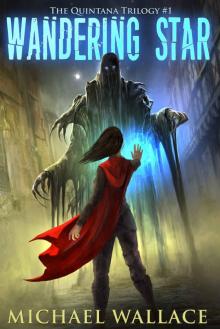 Wandering Star (The Quintana Trilogy Book 1)
Wandering Star (The Quintana Trilogy Book 1)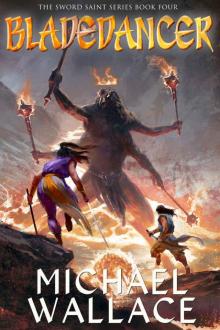 Bladedancer
Bladedancer Sword Saint
Sword Saint The Alliance Trilogy
The Alliance Trilogy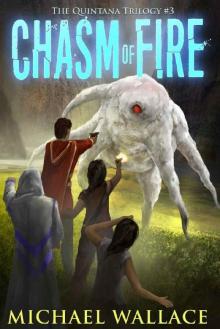 Chasm of Fire
Chasm of Fire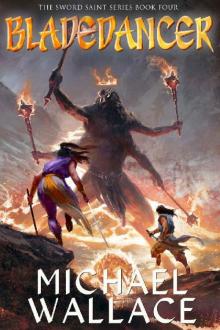 Bladedancer (The Sword Saint Series Book 4)
Bladedancer (The Sword Saint Series Book 4) The Devil's Deep
The Devil's Deep Shadow Walker (The Sword Saint Series Book 3)
Shadow Walker (The Sword Saint Series Book 3) Starship Blackbeard
Starship Blackbeard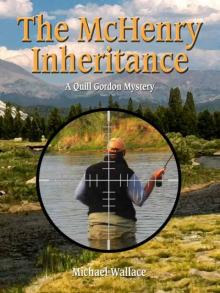 The McHenry Inheritance (Quill Gordon Mystery Book 1)
The McHenry Inheritance (Quill Gordon Mystery Book 1) Sun King (The Void Queen Trilogy Book 3)
Sun King (The Void Queen Trilogy Book 3) Blood of Vipers
Blood of Vipers Righteous - 01 - The Righteous
Righteous - 01 - The Righteous I Scarce Can Die (Quill Gordon Mystery Book 5)
I Scarce Can Die (Quill Gordon Mystery Book 5) The Devil's Cauldron
The Devil's Cauldron The Wicked (The Righteous)
The Wicked (The Righteous) Crow Hollow
Crow Hollow Righteous03 - The Wicked
Righteous03 - The Wicked Righteous02 - Mighty and Strong
Righteous02 - Mighty and Strong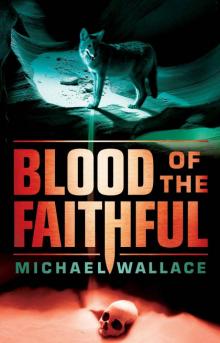 Blood of the Faithful
Blood of the Faithful Wash Her Guilt Away (Quill Gordon Mystery Book 2)
Wash Her Guilt Away (Quill Gordon Mystery Book 2) The Kingdom of the Bears
The Kingdom of the Bears The Emerald Crown (The Red Sword Trilogy Book 3)
The Emerald Crown (The Red Sword Trilogy Book 3) The Dark Citadel
The Dark Citadel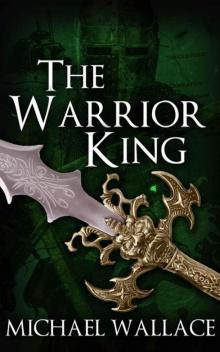 The Warrior King (Book 4)
The Warrior King (Book 4) Rebellion of Stars (Starship Blackbeard Book 4)
Rebellion of Stars (Starship Blackbeard Book 4) Righteous04 - The Blessed and the Damned
Righteous04 - The Blessed and the Damned The Crescent Spy
The Crescent Spy Queen of the Void (The Void Queen Trilogy Book 1)
Queen of the Void (The Void Queen Trilogy Book 1)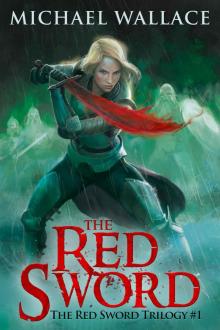 The Red Sword (The Red Sword Trilogy Book 1)
The Red Sword (The Red Sword Trilogy Book 1) The Sentinel (The Sentinel Trilogy Book 1)
The Sentinel (The Sentinel Trilogy Book 1) The Golden Griffin (Book 3)
The Golden Griffin (Book 3) The Blessed and the Damned (Righteous Series #4)
The Blessed and the Damned (Righteous Series #4) Hell's Fortress
Hell's Fortress Not Death, But Love (Quill Gordon Mystery Book 3)
Not Death, But Love (Quill Gordon Mystery Book 3) Destroying Angel
Destroying Angel The Free Kingdoms (Book 2)
The Free Kingdoms (Book 2) Dragon Quadrant (The Sentinel Trilogy Book 2)
Dragon Quadrant (The Sentinel Trilogy Book 2) Shattered Sun (The Sentinel Trilogy Book 3)
Shattered Sun (The Sentinel Trilogy Book 3)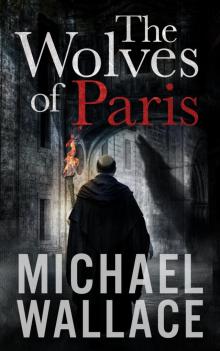 The Wolves of Paris
The Wolves of Paris Lords of Space (Starship Blackbeard Book 2)
Lords of Space (Starship Blackbeard Book 2) Dreadnought (Starship Blackbeard Book 3)
Dreadnought (Starship Blackbeard Book 3) The Village of Dead Souls: A Zombie Novel
The Village of Dead Souls: A Zombie Novel The Black Shield (The Red Sword Book 2)
The Black Shield (The Red Sword Book 2) The Daughters Of Alta Mira (Quill Gordon Mystery Book 4)
The Daughters Of Alta Mira (Quill Gordon Mystery Book 4) Mighty and Strong (The Righteous)
Mighty and Strong (The Righteous)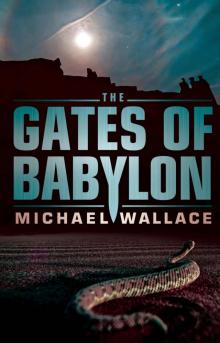 The Gates of Babylon
The Gates of Babylon